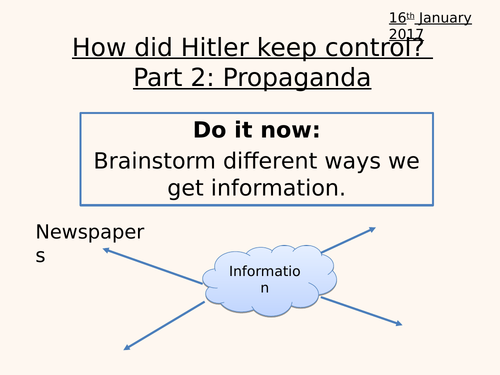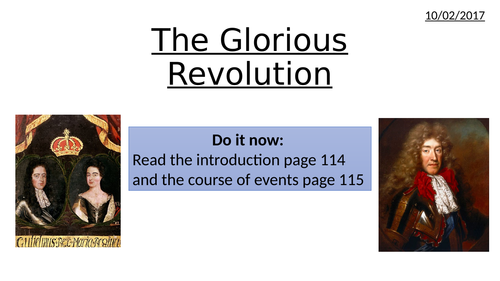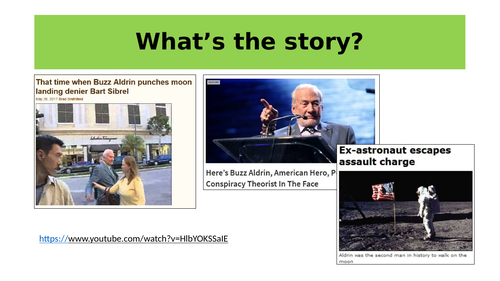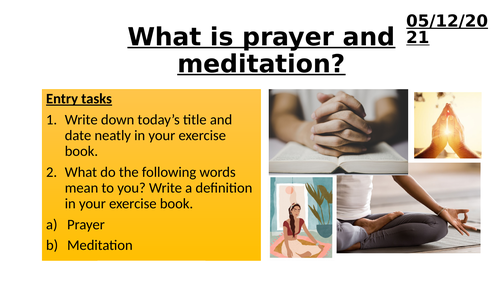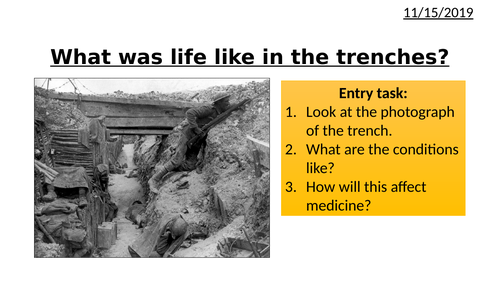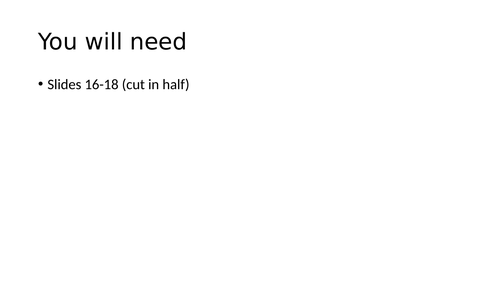338Uploads
116k+Views
41k+Downloads
All resources

Did Charles I deserve to be executed?
Suitable for 11-14s. Whole lesson plus differentiated resources asking did Charles I deserve to be executed? Students look at a range of evidence to come to a judgement. Also look at the consequences and aftermath of his death.

Nazi Propaganda
Whole lesson plus differentiated resources for a lesson on Nazi Propaganda, suitable for 14-16s. Looks at the role of Goebells, and includes a worksheet on annotating Nazi propaganda posters.

The Glorious Revolution
Suitable for 16-18s, A/ AS level lesson on the Glorious Revolution - used more as a summary lesson for Year 13s. Includes a BBC article and useful video plus video quiz. All resources included.

Did man land on the Moon? STEM Lesson
Whole lesson plus resources for teaching ‘did man land on the Moon?’
This was created as part of STEM week, ** this can be used as a stand alone lesson in Primary, or KS3 History or Science!**
Students use information sheets (provided) to decide for themselves in man landed on the moon. They use this to complete a table analysing the evidence. Students also complete differentiated activities, including a higher level thinking question of ‘do we live in a post truth age?’
A fantastic lesson that really gets students thinking and debating!
Please review if you purchase.

GCSE WW1 Medicine Exam Skills Guide
For teaching Edexcel 9-1 GCSE Medicine Through Time - WW1 Historic Environment
This is an exam skills guide to be given to students which breaks down all 3 questions with a comprehensive guide on how to answer each question. Includes exam questions and model answers.
This was written as an exam marker for Medicine Through Time!
Students have given feedback that they find this guide extremely useful and bring it to every lesson to support their exam questions!
Please review if you purchase, and check out my other WW1 resources.

Why did Henry VIII create the Church of England?
Whole lesson plus all resources needed for teaching 11-14s Why did Henry VIII create the Church of England?
This lesson looks at the reasons why Henry VIII created the Church of England;
Divorce
Money
Reform the church
This is done using a variety of differentiated tasks, including videos, sorting out fact cards and putting statements in the correct chronological order.
Finally, students will decide on the most important reason Henry VIII created the Church of England.
Please review if you purchase and check out my other Tudor resources.

What is Science?
KS3 Philosophy and Ethics - Lesson 3 of the Science and Religion SoW.
This lesson looks at ‘What is Science’?
Students will be able to:
Explain what the scientific method is and use it to look at real life experiments.
Discuss at least two things that science now explains that used to be explained by religion.
State at least three areas that are involved in science.
All resources included!
Feedback is welcome, please check out the rest of my lessons in the Science and Religion Scheme of Work!

What happens when we die? - Religion
KS3 Philosophy and Ethics - Lesson 3 of the ‘What Big Questions are there?’ Scheme of Work.
This lesson looks at 'How do different religions answer the question ‘What happens when we die?'
This lesson looks at the religious answer to ‘What happens when we die?’ - Looking at the 6 major religions and their beliefs.
By the end of the lesson, students will be able to:
Explain what you believe and express your opinion on issues relating to what happens when we die.
Describe what the worlds six main religions believe happens when we die.
Understand and explore examples of ‘Near Death Experiences’.
Resources are included - including an information sheet and differentiated table for students to fill in!
Feedback is welcome, please check out the rest of my lessons in the ‘What Big Questions are there?’

Why is there evil and suffering?
KS3 Philosophy and Ethics - Lesson 4 of the ‘What Big Questions are there?’ Scheme of Work.
This lesson looks at ‘Why is there evil and suffering in the world’?
This lesson is an introduction to understanding why there is evil and suffering, looking at the differences between moral and natural evil with examples.
By the end of the lesson, students will be able to:
Express your own feelings and suggest reasons why evil and suffering happens.
Explain about how evil and suffering affects many people.
Question why there is evil and suffering in the world if there is a good God.
No worksheets needed - ready to download and teach straight away!
Feedback is welcome, please check out the rest of my lessons in the ‘What Big Questions are there?’

Five Pillars of Islam | Islam
KS3 Religious Studies - Lesson 3 of the Islam scheme of work
This lesson looks at The Five Pillars of Islam.
This lesson looks at the Five Pillars. Students will complete a worksheet (gap fill task) on the Five Pillars using a video, and will then reflect and consider what their Five Pillars are - what is important to them?
All worksheets and resources needed are included – ready to download and teach!
Feedback is welcome, please check out the rest of my lessons in the Islam scheme of work.

Importance of exercise
For teaching PSHE ages 11-14 (also suitable for ages 9-11).
Whole lesson plus resources on the importance and benefits of exercise, including a self-reflection task.
All resources are included for a 1 hour lesson.
Please review if you purchase, feedback is welcome!

What was the Black Death?
Suitable for teaching KS3.
What was the Black Death? An enquiry lesson that looks at the skeletons recently discovered at Charterhouse Square. Students need to investigate what killed 50% of the population in 1348. Even includes news clips from when the skeletons were discovered!!
Whole lesson including differentiated activities and resources.
It is useful to have the textbook Making Sense of History textbook 1066-1509
however the lesson can be adapted for use without out as it is only needed for one task.

Democracy and Dictatorship
Suitable for teaching 11-16s.
This lesson looks at the difference between democracy and dictatorship and can be used as a starter lesson for introducing Nazi Germany or the Cold War.
The lesson includes activities such as sorting political parties on a spectrum and understanding countries that are a democracy/dictatorship today.
Please review if you buy and check out my other resources.

WW1 Propaganda
Suitable for teaching 11-14 on reasons why people signed up for WW1 - Why did people to go war?
The whole lesson plus resources looks at why people signed up for WW1 using propaganda. The students will analyse examples of WW1 propaganda, understanding how this persuaded young men to join the war effort.
If you purchase, please review and check out my other WW1 lessons.

Battle of Britain
For teaching 11-14s
Why did Britain win the Battle of Britain?
This lesson looks at why Britain won the Battle of Britain. Students begin by understanding the context after Dunkirk and Hitler’s plan (including 2 videos!), then looking at which side was better prepared.
Then students will use differentiated sources (included) to assess why Britain won the Battle of Britain.
Please note 20th Century World textbooks by SHP are needed for 1 task (the which side was better prepared) but the rest of the lesson is fully resourced!
Feedback is welcome; please review if you purchase!

Introduction to Prayer and Meditation
Suitable for teaching KS2 or KS3.
What is prayer and meditation?
This lesson looks at:
What is prayer?
Why do people pray?
What is meditation?
Looking at aids to prayer and meditation in different religions.
Lesson objectives:
Grade 8-9: Analyse why different people pray and meditate and correctly identify aids to prayer for different religions.
Grade 5-7: Consider why people pray and meditate, and describe the aids used by different religions.
Grade 3-4: Identify aids to prayer and know what religion they are used in.
Feedback is welcome, please review if you purchase!

Norman Conquest: Motte and Bailey Castles
Suitable for teaching 11-14s Norman Conquest (can be adapted for primary).
Whole lesson plus all differentiated resources needed on motte and bailey castles! Students will be answering the enquiry question:
Why did William the Conqueror build so many castles?
Students use Warwick Castle as a case study (fantastic if you go there on a trip), label a motte and bailey castle, look at how to attack and defend, and finally understand why William built so many castles around the country.
A really fun and interactive lesson which students love.
Please review if you purchase, and check out my other Norman Conquest resources.

GCSE: Introduction to WW1 Medicine
For teaching GCSE Edexcel 9-1 Medicine Through Time - British Sector on the Western Front
This whole lesson plus resources (as a booklet, but can be easily adapted to be worksheets for exercise books) is an introduction for WW1 Medicine. This lesson looks at;
What are trenches? How did we come to trench warfare?
Analysing two letter extracts from Richard Smethurst, with a focus on medical conditions that can be ascertained from them
Trench structure
A selection of WW1 videos for making a mind-map about life in the trenches, including The Somme, Gas, Barbed Wire and more.
The whole lesson has an underlying focus on medicine to encourage students to discuss and consider the medical conditions that may arise in the trenches.
Please review if you purchase, and check out my other WW1 Medicine lessons!

Schlieffen Plan
For teaching 11-14s WW1.
Whole lesson plus resources on the Schlieffen Plan. The lesson looks at what the German plan is (and gets students to come up with their own), and the failure of the Schlieffen Plan by analyising the source ‘Bravo, Belgium’. Students will then decide the most important reason for failure.
Please review if you purchase, and check out my other WW1 lessons!

What was life like in the trenches?
For teaching 11-14s WW1.
What was life like in the trenches? Whole lesson plus resources included. Students start with a key word-description match up, and also look at two letters by Richard Smethurst in the trenches, analysing them for key details.
The main part of the lesson gets students to make notes/mind-map on life in the trenches using carefully selected videos (mostly Dan Snow’s fantastic WW1 Uncut series) and then writing a trench letter.
Please review if you purchase, and take a look at my other WW1 lessons and resources.


